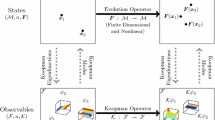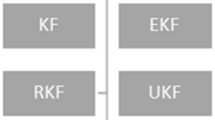Abstract
This paper considers the parameter estimation problem of stochastic systems (i.e., controlled autoregressive systems) by adopting the projection method and the hierarchical identification principle. To improve the performance of the projection identification algorithm, a generalized projection algorithm is proposed by introducing a data window length. By means of the hierarchical identification principle, we divide the system into two fictitious subsystems and derive a two-stage generalized projection identification algorithm. The simulation example tests the effectiveness of the proposed identification algorithms.






Similar content being viewed by others
References
Y. Cao, P. Li, Y. Zhang, Parallel processing algorithm for railway signal fault diagnosis data based on cloud computing. Future Gener. Comput. Syst. 88, 279–283 (2018)
Y. Cao, L.C. Ma, S. Xiao et al., Standard analysis for transfer delay in CTCS-3. Chin. J. Electron. 26(5), 1057–1063 (2017)
Y. Cao, Y. Wen, X. Meng, W. Xu, Performance evaluation with improved receiver design for asynchronous coordinated multipoint transmissions. Chin. J. Electron. 25(2), 372–378 (2016)
M.Z. Chen, D.Q. Zhu, A workload balanced algorithm for task assignment and path planning of inhomogeneous autonomous underwater vehicle system. IEEE Trans. Cogn. Dev. Syst. (2018). https://doi.org/10.1109/TCDS.2018.2866984
F. Ding, System Identification: Hierarchical Identification Principle and Methods (Science Press, Beijing, 2019). (To be published)
J.L. Ding, Recursive and iterative least squares parameter estimation algorithms for multiple-input-output-error systems with autoregressive noise. Circuits Syst Signal Process 37(5), 1884–1906 (2018)
J.L. Ding, The hierarchical iterative identification algorithm for multi-input-output-error systems with autoregressive noise. Complexity 2017, 1–11 (2017). https://doi.org/10.1155/2017/5292894
F. Ding, H.B. Chen et al., A hierarchical least squares identification algorithm for Hammerstein nonlinear systems using the key term separation. J. Frankl. Inst. 355(8), 3737–3752 (2018)
F. Ding, L. Xu et al., Iterative parameter identification for pseudo-linear systems with ARMA noise using the filtering technique. IET Control Theory Appl. 12(7), 892–899 (2018)
F. Ding, L. Xu, Q.M. Zhu, Performance analysis of the generalised projection identification for time-varying systems. IET Control Theory Appl. 10(18), 2506–2514 (2016)
M. Gan, C.L.P. Chen, G.Y. Chen, L. Chen, On some separated algorithms for separable nonlinear squares problems. IEEE Trans. Cybern. 48(10), 2866–2874 (2018)
M. Gan, H.X. Li, H. Peng, A variable projection approach for efficient estimation of RBF-ARX model. IEEE Trans. Cybern. 45(3), 462–471 (2015)
H.L. Gao, C.C. Yin, The perturbed sparre Andersen model with a threshold dividend strategy. J. Comput. Appl. Math. 220(1–2), 394–408 (2008)
F.Z. Geng, S.P. Qian, An optimal reproducing kernel method for linear nonlocal boundary value problems. Appl. Math. Lett. 77, 49–56 (2018)
G. Golub, V. Pereyra, Separable nonlinear least squares: the variable projection method and its applications. Inverse Probl. 19(2), R1–R26 (2003)
P.C. Gong, W.Q. Wang, F.C. Li, H. Cheung, Sparsity-aware transmit beamspace design for FDA-MIMO radar. Signal Process. 144, 99–103 (2018)
Y. Gu, J. Liu, X. Li, Y. Chou, Y. Ji, State space model identification of multirate processes with time-delay using the expectation maximization. J. Frankl. Inst. (2019). https://doi.org/10.1016/j.jfranklin.2018.08.030
Z. Hidayat, R. Babuška, A. Núez, B.D. Schutter, Identification of distributed-parameter systems from sparse measurements. Appl. Math. Modell. 51, 605–625 (2017)
Y.B. Hu, Iterative and recursive least squares estimation algorithms for moving average systems. Simul. Model. Pract. Theory 34, 12–19 (2013)
Y.B. Hu, B.L. Liu, Q. Zhou, A multi-innovation generalized extended stochastic gradient algorithm for output nonlinear autoregressive moving average systems. Appl. Math. Comput. 247, 218–224 (2014)
Y.B. Hu, B.L. Liu, Q. Zhou, C. Yang, Recursive extended least squares parameter estimation for Wiener nonlinear systems with moving average noises. Circuits Syst. Signal Process. 33(2), 655–664 (2014)
M.H. Li, X.M. Liu, The least squares based iterative algorithms for parameter estimation of a bilinear system with autoregressive noise using the data filtering technique. Signal Process. 147, 23–34 (2018)
M.H. Li, X.M. Liu, Auxiliary model based least squares iterative algorithms for parameter estimation of bilinear systems using interval-varying measurements. IEEE Access 6, 21518–21529 (2018)
X.Y. Li, B.Y. Wu, A new reproducing kernel collocation method for nonlocal fractional boundary value problems with non-smooth solutions. Appl. Math. Lett. 86, 194–199 (2018)
X. Li, D.Q. Zhu, An improved SOM neural network method to adaptive leader–follower formation control of AUVs. IEEE Trans. Ind. Electron. 65(10), 8260–8270 (2018)
F. Liu, A note on Marcinkiewicz integrals associated to surfaces of revolution. J. Aust. Math. Soc. 104(3), 380–402 (2018)
F. Liu, H.X. Wu, A note on the endpoint regularity of the discrete maximal operator. Proc. Am. Math. Soc. 147(2), 583–596 (2019)
F. Liu, H.X. Wu, Singular integrals related to homogeneous mappings in Triebel–Lizorkin spaces. J. Math. Inequal. 11(4), 1075–1097 (2017)
J. Pan, W. Li, H.P. Zhang, Control algorithms of magnetic suspension systems based on the improved double exponential reaching law of sliding mode control. Int. J. Control Autom. Syst. 16(6), 2878–2887 (2018)
J. Pan, H. Ma, X. Jiang, et al., Adaptive gradient-based iterative algorithm for multivariate controlled autoregressive moving average systems using the data filtering technique. Complexity (2018), Article ID 9598307. https://doi.org/10.1155/2018/9598307
Z.H. Rao, C.Y. Zeng, M.H. Wu et al., Research on a handwritten character recognition algorithm based on an extended nonlinear kernel residual network. KSII Trans. Internet Inf. Syst. 12(1), 413–435 (2018)
R.S. Risuleo, G. Bottegal, H. Hjalmarsson, A nonparametric kernel-based approach to Hammerstein system identification. Automatica 85, 234–247 (2017)
L. Xu, The parameter estimation algorithms based on the dynamical response measurement data. Adv. Mech. Eng. 9(11), 1–12 (2017). https://doi.org/10.1177/1687814017730003
L. Xu, F. Ding, Recursive least squares and multi-innovation stochastic gradient parameter estimation methods for signal modeling. Circuits Syst. Signal Process. 36(4), 1735–1753 (2017)
L. Xu, F. Ding, Iterative parameter estimation for signal models based on measured data. Circuits Syst. Signal Process. 37(7), 3046–3069 (2018)
L. Xu, F. Ding, Parameter estimation for control systems based on impulse responses. Int. J. Control Autom. Syst. 15(6), 2471–2479 (2017)
L. Xu, F. Ding, The parameter estimation algorithms for dynamical response signals based on the multi-innovation theory and the hierarchical principle. IET Signal Process. 11(2), 228–237 (2017)
L. Xu, F. Ding, Y. Gu et al., A multi-innovation state and parameter estimation algorithm for a state space system with d-step state-delay. Signal Process. 140, 97–103 (2017)
G.H. Xu, Y. Shekofteh, A. Akgul, C.B. Li, S. Panahi, A new chaotic system with a self-excited attractor: entropy measurement, signal encryption, and parameter estimation. Entropy 20(2), 1–23 (2018). https://doi.org/10.3390/e20020086
L. Xu, W.L. Xiong et al., Hierarchical parameter estimation for the frequency response based on the dynamical window data. Int. J. Control Autom. Syst. 16(4), 1756–1764 (2018)
C.C. Yin, C.W. Wang, The perturbed compound Poisson risk process with investment and debit interest. Methodol. Comput. Appl. Probab. 12(3), 391–413 (2010)
C.C. Yin, Y.Z. Wen, Exit problems for jump processes with applications to dividend problems. J. Comput. Appl. Math. 245, 30–52 (2013)
C.C. Yin, Y.Z. Wen, Optimal dividend problem with a terminal value for spectrally positive Levy processes. Insur. Math. Econ. 53(3), 769–773 (2013)
C.C. Yin, K.C. Yuen, Optimality of the threshold dividend strategy for the compound Poisson model. Stat. Probab. Lett. 81(12), 1841–1846 (2011)
C.C. Yin, J.S. Zhao, Nonexponential asymptotics for the solutions of renewal equations, with applications. J. Appl. Probab. 43(3), 815–824 (2008)
Y.Z. Zhang, Y. Cao, Y.H. Wen, L. Liang, F. Zou, Optimization of information interaction protocols in cooperative vehicle-infrastructure systems. Chin. J. Electron. 27(2), 439–444 (2018)
X. Zhang, F. Ding et al., Recursive parameter identification of the dynamical models for bilinear state space systems. Nonlinear Dyn. 89(4), 2415–2429 (2017)
X. Zhang, F. Ding et al., State filtering-based least squares parameter estimation for bilinear systems using the hierarchical identification principle. IET Control Theory Appl. 12(12), 1704–1713 (2018)
X. Zhang, L. Xu et al., Combined state and parameter estimation for a bilinear state space system with moving average noise. J. Frankl. Inst. 355(6), 3079–3103 (2018)
W.H. Zhang, L. Xue, X. Jiang, Global stabilization for a class of stochastic nonlinear systems with SISS-like conditions and time delay. Int. J. Robust Nonlinear Control 28(13), 3909–3926 (2018)
N. Zhao, R. Liu, Y. Chen, M. Wu, Y. Jiang, W. Xiong, C. Liu, Contract design for relay incentive mechanism under dual asymmetric information in cooperative networks. Wirel. Netw. 24(8), 3029–3044 (2018)
Acknowledgements
This work was supported by the National Key R&D Program of China (No. 2016YFE0202200) and the Research Foundation of China University of Petroleum-Beijing At Karamay (No. CYJ2017B-01-001).
Author information
Authors and Affiliations
Corresponding authors
Rights and permissions
About this article
Cite this article
Hu, Y., Zhou, Q., Yu, H. et al. Two-Stage Generalized Projection Identification Algorithms for Stochastic Systems. Circuits Syst Signal Process 38, 2846–2862 (2019). https://doi.org/10.1007/s00034-018-0996-0
Received:
Revised:
Accepted:
Published:
Issue Date:
DOI: https://doi.org/10.1007/s00034-018-0996-0




